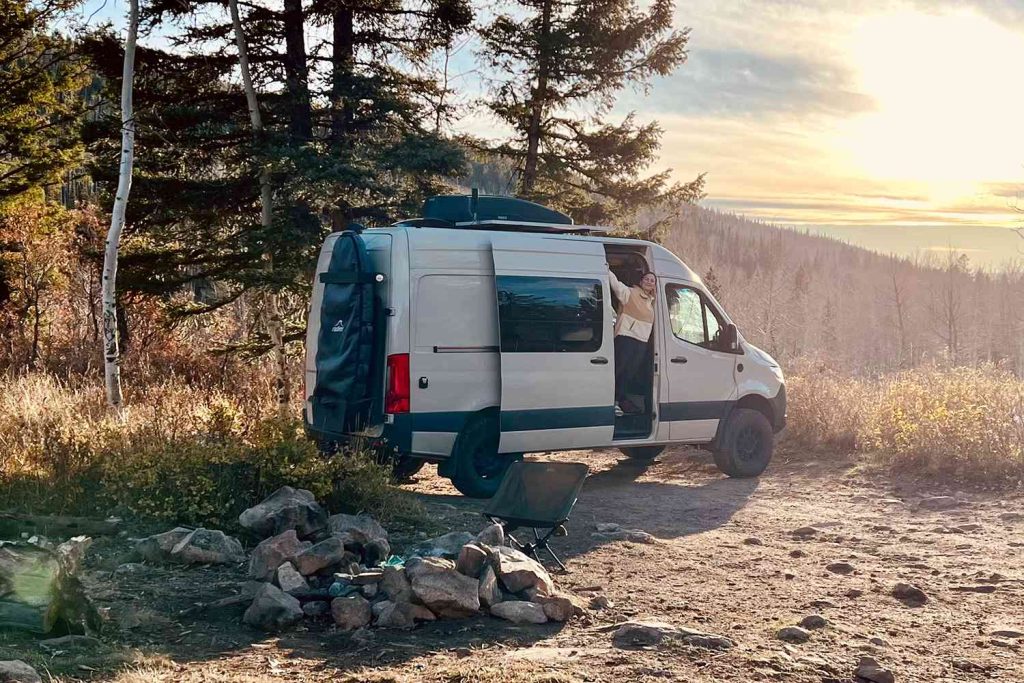In movies, road trips are portrayed as a whimsical, impromptu, and fast-paced style of traveling that peaks with sunny days and is often triggered by life-changing events. And while road trips are certainly a carefree style of travel (you plan your own itinerary, schedule, and can bring whatever you want with no TSA restrictions or weight limits), road trips aren't as easy as they seem on the silver screen.
“Taking a road trip and traveling in your vehicle is without a doubt one of the most challenging types of travel you can do,” shares Mimi Hammeran independent designer who lives part-time in her camper van and travels around the country. Still, she continues, “that’s part of the adventure and part of the reason we seek out these experiences, because they challenge us.”
Frequent travelers like Hammer know there are some challenges that are more common than others, from lodging logistics to vehicle security to the equally important need to satisfy caffeine cravings and enhance entertainment. Here’s how to overcome these obstacles, from overcoming the obvious to preparing for the unexpected on your next road trip.
Always leave extra time
The golden rule of travel applies to road trips, too, Hammer says. She's driven across the country three times with her partner so far, and even with the trip planned in advance, they found themselves wanting to stop and explore more than they ever imagined.
“The best part of a road trip is when you stumble upon places and sights you never knew existed,” she says. After all, after spending hours in the car, exploring cafes, back streets, and towns is all the more appealing. “Plan extra time to allow yourself to enjoy these impromptu, unexpected sights and experiences that you can never plan for.”
Mimi Hammer
be ready
Mentally, physically, and logistically, the best thing road trippers can do is be prepared.
For example, you're bound to feel sleepy while driving, and it can be 11 p.m. without a Starbucks in sight. “We had a stash of 5-Hour Energy in the car so we wouldn't have to stop for coffee,” Hammer says.
AAA spokesperson Aixa Diaz adds: “Prepare an emergency kit with first aid supplies, a jumper cable, a flashlight, blankets, water and snacks, such as nuts or granola bars. Anything you need to be comfortable in the event of a breakdown or being stuck in traffic for hours.”
In addition to taking care of your personal needs, think about and prepare for everything that can happen with a vehicle. Diaz suggests checking your tires, battery, and oil at least a week before you hit the road, in case your car needs unexpected maintenance. And keep your phone charged, Diaz advises: “If you’re in an area without cell service, some iPhone users can call AAA Emergency Roadside Assistance via satellite.”
Line up the entertainment
Getty
“When you’re in the car for a long time, you have nothing to do to keep you busy,” Hammer says. Even your favorite playlists get monotonous after a while!
“There can be some really long drives on flat roads through farmland, so it’s a fun idea to get entertainment and media from your network,” she suggests, noting that she’s built a portfolio of podcasts, audiobooks, and new music that she’s polled friends on Instagram and downloaded before the trip. “You never know what the service will be like on the road, so it’s best to have them on hand.”
Pay attention to your personal space
Katerinandyinon/Instagram
After crossing Australia in a van, travel influencers Katerina and Yinon Horwitz I learned the importance of setting boundaries.
“Knowing when to have a deep conversation and when to relax and listen to music is one of the most helpful things you can do on a road trip,” the couple said via email.
Since everyone is different, it’s also an act of getting to know your partner better, understanding and supporting what motivates them to make the best journey possible for each other. “It’s a great way to practice building a life together,” they add.
Stick to your budget
Mimi Hammer
The two biggest costs of a road trip are gas and lodging. If you’re traveling in an RV, these costs are significantly reduced, but you’ll still have to pay fees for overnight campsites. These costs can be planned for in advance, using platforms like Hippie camp Or iOverlanderexplains Hammer, who has found them useful in rural areas of the country. For travelers in standard cars traveling through urban destinations, HotelTonight is an app to use for last minute hotel deals.
With gas prices constantly fluctuating, your overhead is less predictable, but to get a rough idea, Diaz suggests using AAA's fuel cost calculator to estimate fuel costs for your vehicle's make and model. For a handy gas-saving tip, Diaz says, “Watch your speed! Fuel economy peaks around 50 mph on most cars, then declines as speed increases. Reducing highway speeds by 5 to 10 mph can increase fuel economy by up to 14 percent.”


